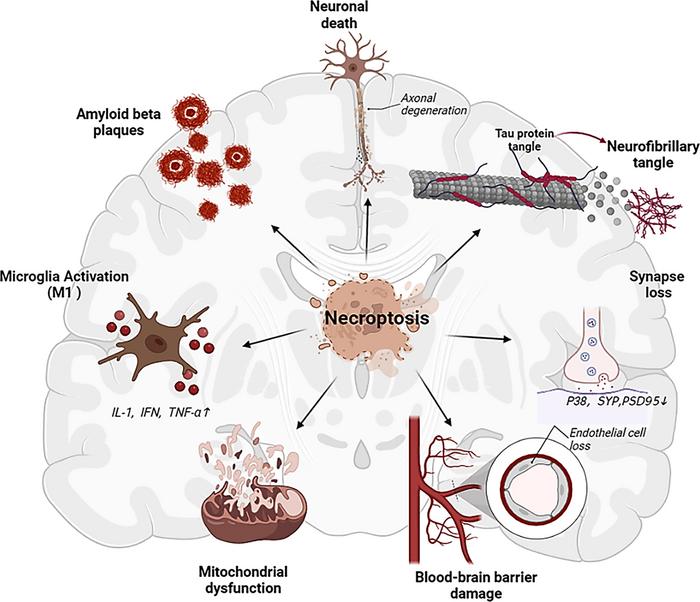Amsterdam, September 28, 2023 – A special supplement to the Journal of Alzheimer’s Disease, published by IOS Press, presents insights and new directions in both basic and clinical research into neurodegenerative diseases. Because by 2050, the number of people suffering from brain disorders is estimated to reach 155 million, now is the time to think innovatively to discover new pathways for future brain studies.

Credit: R. Zhang, Y. Song, X. Su, “Necroptosis and Alzheimer’s Disease: Pathogenic Mechanisms and Therapeutic Opportunities,” https://doi.org/10.3233/JAD-220809, Journal of Alzheimer’s Disease
Amsterdam, September 28, 2023 – A special supplement to the Journal of Alzheimer’s Disease, published by IOS Press, presents insights and new directions in both basic and clinical research into neurodegenerative diseases. Because by 2050, the number of people suffering from brain disorders is estimated to reach 155 million, now is the time to think innovatively to discover new pathways for future brain studies.
Neurodegenerative disorders like Alzheimer’s and Parkinson’s diseases are currently affecting 55 million people worldwide. With no cure in sight, it is of vital importance to understand more of our brain’s biology to alleviate the burden of brain disorders.
Co-Guest Editor of the supplement, Jagannatha Rao Kosagisharaf, PhD, Pro-Chancellor, Koneru Lakshmaiah Education Foundation (KLEF) Deemed to be University, Vaddeswaram, Andhra Pradesh, India; and SNI, INDICASAT AIP, Panama, explains: “One of the key issues is the increased incidence of neurodegenerative disorders in the world population, primarily due to an increase in life expectancy. Despite an enormous upsurge in our understanding of the cellular and molecular pathways associated with cell death, the key molecular determinants to modulate these processes in human diseases are still not revealed, hindering the development of effective treatments and prevention avenues for aging and neurodegeneration. In the near future, many new innovative approaches are needed to understand novel molecular pathways and therapeutics in neurodegenerative diseases.”
This supplement is a topical collection of curated thematic reviews and research papers on novel molecular pathways and therapeutic challenges in neurodegenerative diseases. It explores the following themes:
- Novel small molecules with neuroprotection properties
- Novel therapeutic approaches other than chemical molecules
- Role of gut microbiota in neurodegeneration therapeutics
- New and novel metabolic pathways in neuronal cell death including novel biomarkers
The supplement encompasses several pioneering approaches to understanding neurodegenerative diseases. “With a series of studies, it explores novel molecular pathways, potential therapeutic targets, non-chemical treatments, and the role of gut microbiota and metabolic pathways in neurodegeneration. Each study makes a unique contribution to our understanding, offering fresh perspectives on neuroprotection properties, disease-modifying strategies, and potential biomarkers in neurodegenerative conditions,” says co-Guest Editor Muralidhar L. Hegde, PhD, Division of DNA Repair Research, Center for Neuroregeneration, Department of Neurosurgery, Houston Methodist Research Institute and Weill Cornell Medical College.
One of the articles explores the benefits of acupuncture therapy (AT) in improving dementia. Previous studies have shown AT positively improves the cognitive function of dementia patients, but systematic multi-target and multi-mechanism studies of AT on dementia patients remain limited and need further exploration.
Lead investigator Yaogang Wang, PhD, School of Integrative Medicine, Public Health Science and Engineering College, Tianjin University of Traditional Chinese Medicine, and School of Public Health, Tianjin Medical University, China, notes, “We conducted an integrated analysis of AT in treating Alzheimer’s disease and vascular dementia to identify shared and mutually independent therapeutic targets and biological mechanisms to provide a comprehensive perspective on the potential therapeutic effects of AT. We conclude that acupuncture as an effective and safe treatment holds additional and considerable benefits in avoiding or mitigating the possible long-term side effects of pharmacological therapy, assisting the current management strategy, as well as improving the patients’ quality of life and relieving the pressure on health systems.”
Dr. Jagannatha Rao concludes: “This supplement represents the significant progress in the ongoing exploration of neurodegenerative diseases. It delivers a wealth of insights that enhance our comprehension of these conditions, providing hope for a brighter future in neurotherapeutics. The promising developments presented underscore the urgency and potential in neurodegenerative research and illuminate our path towards overcoming these challenging health issues by 2050.”
“Families of those with Alzheimer’s disease are waiting for novel insights that can lead to effective therapeutics and an eventual cure. This issue brings together ideas from some of the brightest minds to move the field forward,” adds George Perry, PhD, Editor-in-Chief, Journal of Alzheimer’s Disease, and Semmes Foundation Distinguished University Chair in Neurobiology at The University of Texas at San Antonio.
Journal
Journal of Alzheimer s Disease
DOI
10.3233/JAD-221018
Method of Research
Systematic review
Subject of Research
Cells
Article Title
Novel Molecular Pathways and Therapeutic Challenges in Neurodegenerative Diseases




